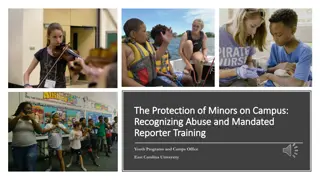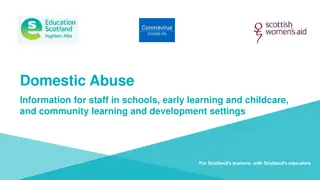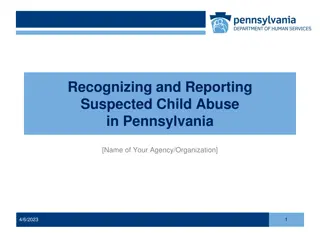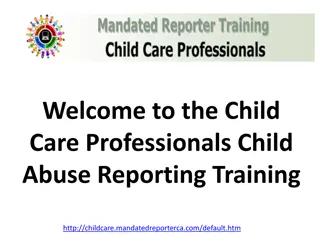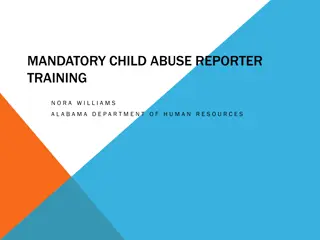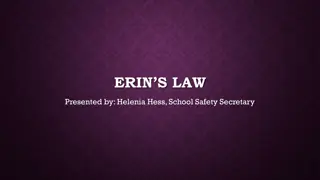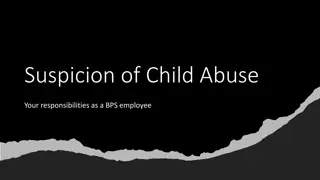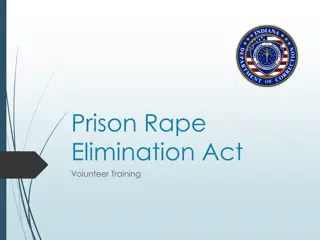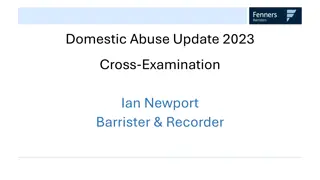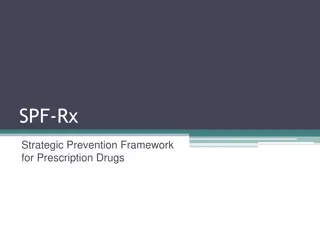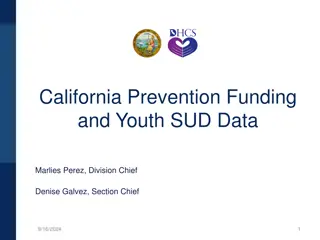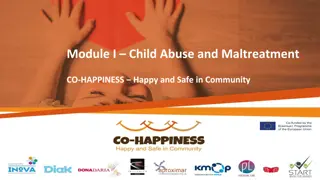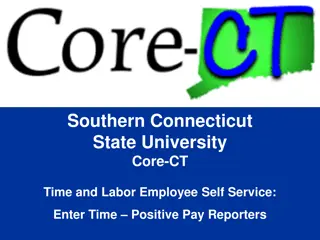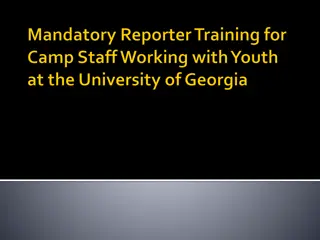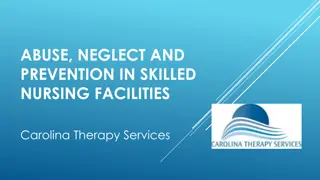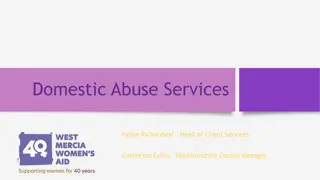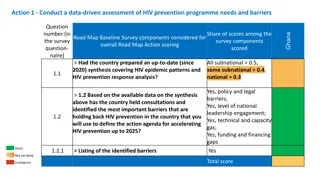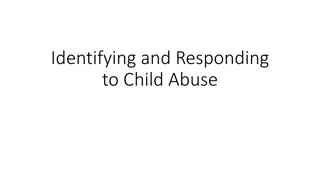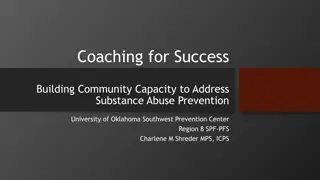Abuse Prevention & Mandated Reporter Training Overview
This presentation provides insights into abuse prevention and the responsibilities of mandated reporters in identifying and reporting abuse or neglect. It covers the risks faced by students, the role of staff in preventing abuse, and the importance of understanding and recognizing signs of abuse. Training details, legal obligations, and reporting processes are highlighted to emphasize the crucial role of mandated reporters in safeguarding children and young adults.
Download Presentation

Please find below an Image/Link to download the presentation.
The content on the website is provided AS IS for your information and personal use only. It may not be sold, licensed, or shared on other websites without obtaining consent from the author.If you encounter any issues during the download, it is possible that the publisher has removed the file from their server.
You are allowed to download the files provided on this website for personal or commercial use, subject to the condition that they are used lawfully. All files are the property of their respective owners.
The content on the website is provided AS IS for your information and personal use only. It may not be sold, licensed, or shared on other websites without obtaining consent from the author.
E N D
Presentation Transcript
1 Abuse Prevention and Mandated Reporter Training Staff On-Line Annual Self Training PowerPoint 7/22/2016
2 2 This PowerPoint Training Will Cover The risks our students face Being a mandated reporter Recognizing if a child or young person is being abused or neglected? What to do if you notice something that concerns you Actions and teaching to help prevent abuse Additional Resources Available on AskHowe
3 3 Why are our students at risk? They may Live in an environment where compliant behavior is required Be socialized to accept being touched by anyone, especially someone called staff Have difficulty telling that abuse or neglect is happening because of communication barriers
4 4 Why are our students at risk, continued They may not receive sex education and so not understand their bodies or boundaries or what abuse is Disclosures of abuse are more likely to be ignored or not believed when made by children and young people who have a disability They can be viewed as easy targets
5 5 Staff training is one way to reduce the risk of abuse Your understanding Will make it less likely that abuse and neglect will occur When they do occur, your understanding will make it less likely that they will be overlooked and more likely that they ll be reported
6 6 Who is a Mandated Reporter ? ANYONE who suspects abuse or neglect can file a report with the Massachusetts Department of Children and Families (DCF) for children, or The Disabled Persons Protection Commission (DPPC) for young adults, or call the local police department. People whose jobs regularly bring them in contact with children and who have been specifically designated by the Legislature as mandated reporters are legally obligated to notify the appropriate agency (DCF or DDPC) when they suspect a child or an adult with a disability is being abused or neglected.
7 7 We are Mandated Reporters We are given the responsibility, by law, to make a report if we have reasonable cause to believe that someone is being abused or neglected We are relied on to prevent the continued abuse or neglect of a child, young person, or adult with disabilities There is a reporting process used by Perkins Educational Programs (refer to the program flow charts, see slide 26)
8 8 Agencies which receive reports of abuse and neglect Disabled Persons Protection Commission (DPPC) Department of Children and Families (DCF) DCF is responsible for protecting children who are under 18 DPPC protects adults with mental and physical disabilities who are between the ages of 18 and 59 They receive all reports of suspected abuse and neglect for that age group They receive all reports of suspected abuse and neglect for that group
9 9 What is meant by abuse and neglect? Abuse Neglect The commitment of an act, not accidentally, that causes physical or emotional injury, or which constitutes a sexual offense under laws of the Commonwealth; or any sexual contact between a caretaker and a child. This includes sexual exploitation. (Summary; very similar for DCF and DPPC) The failure to provide minimally adequate food, clothing, shelter, medical care, supervision, emotional stability and growth, or other essential care (Summary; very similar for DCF and DPPC)
10 10 Additional Definitions Institutional Abuse or Neglect is abuse or neglect which occurs in any facility for children. (DCF) Financial Abuse is the illegal or improper use of another person s funds, property, or assets by a person in a position of trust (DPPC) Mistreatment is use of medications or treatments, isolation or physical or chemical restraint, which harms or creates a substantial likelihood of harm (DPPC)
11 11 How would we know if abuse or neglect was happening? A student may disclose (tells you) Someone else may tell us of their concern We may notice something of concern, that is unusual either behaviorally or physically May occur either inside or outside of school
12 12 If a Student Discloses To You Listen to the student Let the student know you believe them Let the student know they did the right thing by telling Let the student know they ll get help Disclosure gives reasonable cause to believe . Take action, make a report Refer to your program s Mandated Reporter Flow Chart It is the responsibility of the state agency to investigate and to determine if abuse or neglect occurred
13 13 Handling Disclosures: From Middlesex Children s Advocacy Center There are no hard and fast rules that dictate how to respond when a child comes to you and tells you he or she is being abused. Common sense dictates that care must be taken to protect the child and honor the courage it takes to disclose. On the next slide are a few guidelines that may help:
14 14 Handling Disclosure Guidelines Remain calm and show concern but try not to act overly alarmed. A child may retract information or stop talking if he or she senses a strong reaction. Allow the child to tell his or her story in their own way. Avoid probing or leading questions. Let the child know that what happened is not his or her fault. Listen without passing judgment. Most children know their abusers and often have confused feelings. Do not investigate yourself DCF or DPPC and the police are charged with this responsibility. Do not make promises you cannot keep. Let the child know that you will be talking to other people who may be able to help keep them safe. Contact DCF or DPPC and law enforcement for assistance with safety planning and to file a 51A report. Let the child know you will be available if they want to talk again.
15 15 How could we notice something that might indicate abuse or neglect? Be familiar with the student s typical appearance and behavior Be observant Notice changes
16 16 Some Possible Signs from DCF s list of Common Behavioral Indicators of Abuse and Neglect Distrust of others Emotionally withdrawn, detached Extreme watchfulness Abuse of alcohol and other substances Fearful of physical contact/ touch Aggressive, disruptive, and destructive behavior Mimicking the abuse Sudden loss of appetite Curse, hit, or scratch caretaker Fear of the dark, being alone, specific people or places, or going home Cry easily, frequently Nightmares or difficulty sleeping
17 17 Possible Signs of Abuse Physical abuse Sexual abuse Difficulty walking or sitting Pain or itching, bruises or bleeding in the genital area Torn, stained or bloody underclothing; bloody bedding Inappropriate sex play or premature understanding of sex Sexual promiscuity Bruising, welts, puncture wounds, internal injuries, or burns that cannot be sufficiently explained Injuries on children where children don't usually get injured (e.g., the torso, back, neck, buttocks, or thighs)
18 18 Possible Signs of Abuse or Neglect, continued Emotional injury Physical neglect Inability to play as most children do Begging; stealing food; inadequate nutrition or hydration Delays in emotional and intellectual growth Lack of supervision; for example young children left unattended or with other children too young to protect or care for them Speech disorders Constant fatigue Lack of medical or dental care Consistently not having adaptive equipment
19 19 Possible Signs of Financial Abuse Substantial increase in account activity, particularly when a joint account was recently established or someone new is assisting the individual with their finances Person with a disability is accompanied by someone who appears to coax, or otherwise pressure, the individual into making transactions Individual complains that furniture, jewelry, credit cards, or other items are missing
20 20 If I notice something that concerns me, what do I do? If you have reasonable cause to believe If it doesn t rise to the level of reasonable cause to believe Document what you notice Talk with others on the student s team and your supervisor about your concern. Don t wait until it s a crisis. Stay alert and observant If at any point your concern rises to the level of having reasonable cause to believe , report. Definition: To have knowledge of facts which, although not amounting to direct knowledge, would cause a reasonable person, knowing the same facts, to reasonably conclude the same thing. Take action. Make a report.
21 21 Why do people not report? Reluctance to be involved Fear of not being taken seriously/believed Unclear understanding of responsibility as a mandated reporter Reluctance to break code of silence among employees Fear of repercussions
22 22 How Do I Make a Report? Make a report based on whatever information you have, whether a student disclosed to you or you saw a physical or behavioral indicator You don t have to have all the facts. You don t have to have proof. It s the responsibility of the state agency to investigate and to determine if abuse or neglect occurred
23 23 Each Program has a Mandated Reporting Flow Chart It shows a typical reporting process It starts with the reporter telling their supervisor/shift supervisor, or AEC after 5pm and on weekends o This is typical, but you re free report to anyone on the chart The supervisor/shift supervisor consults with the student s counselor or social worker, then tells the Education Director or Superintendent The Flow Charts may have small variations specific to the different programs
24 24 The Flow charts, continued The Response Team meets without delay Response Team may include: Program Director, Superintendent, Student s Counsellor or Social Worker, Supervisor of Residential Living, Nurse, Reporting Staff, Case Manager, Parent Contact, Parent or others The Response Team decides whether to file a report or not If they decide to file, they contact DCF or DPPC by phone and file a written report within 48 hours
25 25 The Flow charts, continued Whether the Response Team decides to file or not, they let the original reporter know their decision If the Response Team didn t file, the reporter decides, based on reasonable cause to believe if they will file as an individual DCF: if the person in charge decides against filing, the individual retains the right to file directly with DCF or DPPC DPPC: all mandated reporters are responsible for ensuring that incidents which warrant reporting are reported.
26 26 Benefits of the Process Outlined on the Flow Charts Outlines clear and accessible steps to use in a stressful situation You are part of a working team More people, more perspectives, more information You can create a more thorough and targeted plan of protection/prevention More sharing of awareness and ideas You still have the right/obligation to report to DCF or DPPC if you have reasonable concern
27 27 An Example of a Mandated Reporting Flow Chart This one refers to Secondary Educational Staff You can find flow charts for each program on AskHowe resources: Mandated Reporting and Related Resources: Program Flow Charts for Reporting Abuse and Neglect
28 28 Filing a 51A Report to DCF as an Individual: Making the Call A Mandated Reporter: Must phone in an oral report immediately by calling the local area office where the child live or the Hotline after-hours or on the weekend; Must file a written report with DCF within 48 hours; May also notify local law enforcement authorities or the Office of the Child Advocate
29 29 What happens When a Report Is Filed With DCF or DPPC? Screened in by the agency Screened out by the agency Investigation No investigation Determine what happened Feedback to reporter DPPC refers to appropriate state agency for follow up Substantiated or not Determine what needs to be done Feedback to the reporter
30 30 Here at School: Whether a report is screened in or out, we continue to: Work with the family Provide appropriate related education and supports for the student Look at what the school can do
31 31 The Fundamentals of Abuse Prevention: Teaching and modeling for our students is their best protection Consent, especially around touch Boundaries Respect If unsure always ask
32 32 Modeling and Teaching of Appropriate Boundaries: Bear in mind the students need for modesty and a right to privacy. Look for opportunities to teach about these concepts. When giving routine care, always let the student know before you touch him/her. In other instances, ask permission from the student before touching and wait for his or her response. Be aware that touch, especially in genital areas, can be stimulating. Be aware of how you touch and of the student s reaction.
33 33 Additional Modeling and Teaching of Appropriate Boundaries: If you are wondering about how to or whether to express comfort or affection to a student, discuss it with his/her team Be conscious of boundaries with students. Residential settings may lend themselves to the breakdown of appropriate staff/student boundaries. If you observe staff-student interactions the concern you because boundaries appear to be breaking down, speak to the staff involved or to your supervisor. If it is not routinely your job, notify a Coordinator if you are going into a student bedroom or the bathroom with him/her.
34 34 Additional Modeling and Teaching of Appropriate Boundaries: If visiting or working with a student in his/her room, pull up a chair. Do not sit on the bed. If you are working on something with the student that requires modesty, close the door. If not, the door should be open. Your sexual life is your own. Even when teaching sex education to students, keep in mind that it is inappropriate for staff to share their own sexual information.
35 35 For more information Department of Children and Families (DCF), www.mass.gov/dcf, 617-748-2000 Disabled Persons Protection Commission (DPPC), www.mass.gov/dppc/, 617-727-6465 Middlesex Children s Advocacy Center affiliated with Middlesex District Attorney s Office www.middlesexcac.org On-line 51A Mandated Reporter Training: http://51a.middlesexcac.org/
36 36 Addition Resources and Information Available on AskHowe You can find much more information on AskHowe under Resources on Educational Programs https://askhowe.perkins.org/resource- categories/mandated-reporting-and-related- resources Additional content available includes information on: Each Program s Mandated Reporting Flow Charts Teaching students Boundaries and Body Awareness Empowering Student Safety Student Risk Factors for Abuse and Neglect More information from DCF and DPPC
37 37 We can help stop abuse and neglect. What we do every day can increase the safety and well- being of our students we can be observant, we can listen, we can empower, we can take action Thank you for your attention Thank you for your good work If you have questions or concerns refer to your supervisor, administrative staff, social workers or student rights advocate in your program Now complete the post-test and let your supervisor know when you have completed the training and post- test



